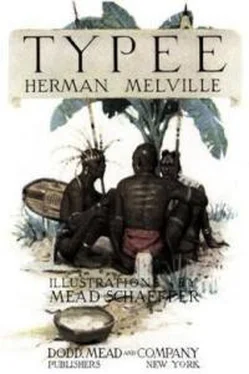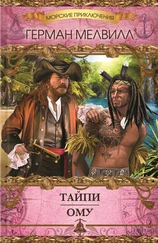This item of information was imparted to us by a most extraordinary individual, a genuine South Sea vagabond, who came alongside of us in a whale–boat as soon as we entered the bay, and, by the aid of some benevolent persons at the gangway, was assisted on board, for our visitor was in that interesting stage of intoxication when a man is amiable and helpless. Although he was utterly unable to stand erect, or to navigate his body across the deck, he still magnanimously proffered his services to pilot the ship to a good and secure anchorage. Our captain, however, rather distrusted his ability in this respect, and refused to recognise his claim to the character he assumed; but our gentleman was determined to play his part, for, by dint of much scrambling, he succeeded in getting into the weather–quarter boat, where he steadied himself by holding on to a shroud, and then commenced issuing his commands with amazing volubility and very peculiar gestures. Of course, no one obeyed his orders; but as it was impossible to quiet him, we swept by the ships of the squadron with this strange fellow performing his antics in full view of all the French officers.
We afterwards learned that our eccentric friend had been a lieutenant in the English navy, but having disgraced his flag by some criminal conduct in one of the principal ports on the main, he had deserted his ship, and spent many years wandering among the islands of the Pacific, until accidentally being at Nukuheva when the French took possession of the place, he had been appointed pilot of the harbour by the newly constituted authorities.
As we slowly advanced up the bay, numerous canoes pushed off from the surrounding shores, and we were soon in the midst of quite a flotilla of them, their savage occupants struggling to get aboard of us, and jostling one another in their ineffectual attempts. Occasionally the projecting out–riggers of their slight shallops, running foul of one another, would become entangled beneath the water, threatening to capsize the canoes, when a scene of confusion would ensue that baffles description. Such strange outcries and passionate gesticulations I never certainly heard or saw before. You would have thought the islanders were on the point of flying at one another’s throats, whereas they were only amicably engaged in disentangling their boats.
Scattered here and there among the canoes might be seen numbers of cocoa–nuts floating closely together in circular groups, and bobbing up and down with every wave. By some inexplicable means these cocoa–nuts were all steadily approaching towards the ship. As I leaned curiously over the side, endeavouring to solve their mysterious movements, one mass, far in advance of the rest, attracted my attention. In its centre was something I could take for nothing else than a cocoa–nut, but which I certainly considered one of the most extraordinary specimens of the fruit I had ever seen. It kept twirling and dancing about among the rest in the most singular manner: and as it drew nearer, I thought it bore a remarkable resemblance to the brown shaven skull of one of the savages. Presently it betrayed a pair of eyes, and soon I became aware that what I had supposed to have been one of the fruit was nothing else than the head of an islander, who had adopted this singular method of bringing his produce to market. The cocoa–nuts were all attached to one another by strips of the husk, partly torn from the shell, and rudely fastened together. Their proprietor, inserting his head into the midst of them, impelled his necklace of cocoa–nuts through the water by striking out beneath the surface with his feet.
I was somewhat astonished to perceive that among the number of natives that surrounded us, not a single female was to be seen. At that time I was ignorant of the fact that by the operation of the “taboo,” the use of canoes in all parts of the island is rigorously prohibited to the entire sex, for whom it is death even to be seen entering one when hauled on shore; consequently, whenever a Marquesan lady voyages by water, she puts in requisition the paddles of her own fair body.
We had approached within a mile and a half perhaps of the foot of the bay, when some of the islanders, who by this time had managed to scramble aboard of us at the risk of swamping their canoes, directed our attention to a singular commotion in the water ahead of the vessel. At first I imagined it to be produced by a shoal of fish sporting on the surface, but our savage friends assured us that it was caused by a shoal of “whinhenies” (young girls), who in this manner were coming off from the shore to welcome us. As they drew nearer, and I watched the rising and sinking of their forms, and beheld the uplifted right arm bearing above the water the girdle of tappa, and their long dark hair trailing beside them as they swam, I almost fancied they could be nothing else than so many mermaids:—and very like mermaids they behaved too.
We were still some distance from the beach, and under slow headway, when we sailed right into the midst of these swimming nymphs, and they boarded us at every quarter; many seizing hold of the chainplates and springing into the chains; others, at the peril of being run over by the vessel in her course, catching at the bob–stays, and wreathing their slender forms about the ropes, hung suspended in the air. All of them at length succeeded in getting up the ship’s side, where they clung dripping with the brine and glowing from the bath, their jet–black tresses streaming over their shoulders, and half enveloping their otherwise naked forms. There they hung, sparkling with savage vivacity, laughing gaily at one another, and chattering away with infinite glee. Nor were they idle the while, for each one performed the simple offices of the toilet for the other. Their luxuriant locks, wound up and twisted into the smallest possible compass, were freed from the briny element; the whole person carefully dried, and from a little round shell that passed from hand to hand, anointed with a fragrant oil: their adornments were completed by passing a few loose folds of white tappa, in a modest cincture, around the waist. Thus arrayed they no longer hesitated, but flung themselves lightly over the bulwarks, and were quickly frolicking about the decks. Many of them went forward, perching upon the head–rails or running out upon the bow–sprit, while others seated themselves upon the taffrail, or reclined at full length upon the boats.
Their appearance perfectly amazed me; their extreme youth, the light clear brown of their complexions, their delicate features, and inexpressibly graceful figures, their softly moulded limbs, and free unstudied action, seemed as strange as beautiful.
The Dolly was fairly captured; and never I will say was vessel carried before by such a dashing and irresistible party of boarders. The ship taken, we could not do otherwise than yield ourselves prisoners, and for the whole period that she remained in the bay, the Dolly , as well as her crew, were completely in the hands of the mermaids.
In the evening after we had come to an anchor, the deck was illuminated with lanterns, and this picturesque band of sylphs, tricked out with flowers, and dressed in robes of variegated tappa, got up a ball in great style. These females are passionately fond of dancing, and in the wild grace and spirit of their style excel everything that I have ever seen. The varied dances of the Marquesan girls are beautiful in the extreme, but there is an abandoned voluptuousness in their character which I dare not attempt to describe.
Our ship was now wholly given up to every species of riot and debauchery. The grossest licentiousness and the most shameful inebriety prevailed, with occasional and but short–lived interruptions, through the whole period of her stay. Alas for the poor savages when exposed to the influence of these polluting examples! Unsophisticated and confiding, they are easily led into every vice, and humanity weeps over the ruin thus remorselessly inflicted upon them by their European civilizers. Thrice happy are they who, inhabiting some yet undiscovered island in the midst of the ocean, have never been brought into contaminating contact with the white man.
Читать дальше








